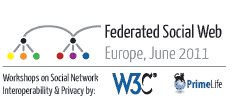News
W3C Workshop: Identity in the Browser
21 March 2011 | Archive
The Web is now critical infrastructure and, as such, requires mechanisms that foster trust. For critical enterprise activity, effective government engagement, and sensitive social information accessed over the Web, a higher level of identity assurance, privacy protection, and security is required, and client-side technologies like browsers have an important role to play. There is a pressing need for trustworthy, widely-applicable digital identity management. W3C is therefore organizing a Workshop on Identity in the Browser, to take place 24-25 May 2011 in Mountain View, California, and hosted by the Mozilla Foundation. Participants will investigate strategies to facilitate the development and deployment of improved identity authentication and authorization technologies across the Web. Also included in the workshop will be explorations into the operational, policy, and legal issues that must be addressed by the solutions. Anyone may participate and there is no fee to participate. All participants are required to submit a position paper by 22 April; see additional participation requirements. To help with planning, brief "expressions of interest" are appreciated as rapidly as possible. Learn more about the Workshop on Identity in the Browser.
W3C Issues Report on Web and Television Convergence
28 March 2011 | Archive
Today, W3C publishes a report from the Second Web and TV Workshop, which took place in Berlin in February. The report summarizes the discussion among the 77 participating organizations and highlights some key Web and TV convergence priorities:
- Adaptive streaming over HTTP
- Home networking and second-screen scenarios
- The role of metadata and relation to Semantic Web technology
- Ensuring that convergent solutions are accessible
- Profiling and testing
- Possible extensions to HTML5 for Television
Prioritization now continues in the W3C Web and TV Interest Group. That group will review existing work, as well as the relationship between services on the Web and TV services. It will identify requirements and potential solutions to ensure that the Web will function well with TV.
The W3C Workshop in Berlin was made possible in part by sponsorship from Netflix, IPTV Forum Japan, and Tomo-Digi. This second Web and TV workshop was also organized with the support of the OMWeb EU project.
W3C Launches Audio Working Group
25 March 2011 | Archive
W3C today launches the Audio Working Group, whose chartered mission is to develop a client-side script API adding more advanced audio capabilities than are currently offered by audio elements. The API will support the features required by advanced interactive applications including the ability to process and synthesize audio streams directly in script, and will extend the HTML5 <audio> and <video> media elements. Learn more about the Rich Web Client Activity.
Databases on the Semantic Web: Drafts Published for R2RML; A Direct Mapping of Relational Data to RDF
24 March 2011 | Archive
The RDB2RDF Working Group has published Working Drafts of R2RML: RDB to RDF Mapping Language and A Direct Mapping of Relational Data to RDF, which enable people to expose relational database data on the Semantic Web. In R2RML, people map their relational database to RDF datasets. The Direct Mapping is intended to provide a default behavior for R2RML. Learn more about the Semantic Web Activity.
CSS Fonts Module Level 3 Draft Published
24 March 2011 | Archive
The Cascading Style Sheets (CSS) Working Group has published a Working Draft of CSS Fonts Module Level 3. Families of fonts typically don't contain a single face for each possible variation of font properties. The CSS font selection mechanism describes how to match a given set of CSS font properties to a given font face, and how font resources are loaded dynamically. Learn more about the Style Activity.
Bringing Communities Together at Federated Social Web Europe
24 March 2011 | Archive
 Social networking has transformed the Web. However, most Social Web applications today limit relationships to those with accounts in the same system. As with many other communications tools (telephone, email, Web) people will ultimately prefer Social Web applications without such barriers, where anyone can communicate seamlessly with anyone else, whatever application they are using. W3C will be exploring how to achieve "One Social Web" at Federated Social Web Europe.
Social networking has transformed the Web. However, most Social Web applications today limit relationships to those with accounts in the same system. As with many other communications tools (telephone, email, Web) people will ultimately prefer Social Web applications without such barriers, where anyone can communicate seamlessly with anyone else, whatever application they are using. W3C will be exploring how to achieve "One Social Web" at Federated Social Web Europe.
The conference, which takes place 3-5 June in Berlin, Germany, is made possible with the help of the PrimeLife project and is hosted by the Heinrich-Böll-Stiftung. It follows the 2010 Federated Social Web Summit and is designed to bring together diverse communities interested in Social Web, identity, and privacy. The agenda will include talks, presentation of position papers, and opportunities for on-the-ground agenda building. Participants are invited to submit position papers, due 2 May. Proposals received after that date may be added to the part of the agenda determined at the event.
Last Call: Widget Packaging and Configuration
22 March 2011 | Archive
The Web Applications Working Group has published a Last Call Working Draft of Widget Packaging and Configuration. This specification standardizes a packaging format and metadata for a class of software known as widgets. Unlike traditional user interface widgets (e.g., buttons, input boxes, toolbars, etc.), widgets as specified in this document are full-fledged client-side applications that are authored using technologies such as HTML5 and then packaged for distribution. Examples range from simple clocks, stock tickers, news casters, games and weather forecasters, to complex applications that pull data from multiple sources to be "mashed-up" and presented to a user in some interesting and useful way. Comments are welcome through 01 May. Learn more about the Rich Web Client Activity.


